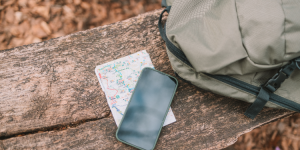
Born in the Fraser Valley, close to Vancouver, Sharilyn spent some 20 years in Calagary where she worked with the Red Cross before setting up her own consultancy company. Six years ago, she chose to move to Argentina where she got the opportunity to develop an eco hotel inside a wildlife reserve. Sharilyn speaks to Expat.com about her daily adventures in Patagonia and everything she likes about the country, from the amazing landscapes to the warm and friendly people.
Hi Sharilyn, please introduce yourself. Where are you from, what are you doing in Argentina, and what were you doing before you arrived?
My name is Sharilyn Amy, Canadian by birth and I grew up in the Fraser Valley just outside of Vancouver, British Columbia, and spent most of my adult life in Calgary, Alberta. I moved to Argentina 6 years ago, and in 2015 found an opportunity to develop an eco-hotel on the beach inside a wildlife reserve. Perfect timing for me as I had fallen in love with the country and wanted to find a meaningful way to stay and make a difference.
Before moving to Argentina, I owned a consultancy that worked with NGOs, universities, foundations, and social service delivery agencies, to help them adapt to changing environments, improve operations, define strategy, and research and analyze opportunities such as Social Enterprise. That work was super challenging serving clients across the country. Before that, I worked for the Red Cross in disaster response and communications, in Canada, China, Bangladesh, and Switzerland.
What brought you to Argentina? How long have you been in the country?
I had been living and working with Calgary as a home base for nearly 20 years, and as much as I loved and still maintain many professional contacts and friends there, it was time to make a big change. I moved with my family to Argentina and took six months off to decompress and reconnect with myself after a very busy career. Outside of returning as an adult student to do my MBA in my 30s, that sabbatical time exploring Argentina and thinking deeply about “what next” was the greatest gift I have ever experienced. I explored every nook and cranny of the country, mostly on horseback, and got some clarity on what was calling me and lighting me up, for the next challenge and phase of my life.
What is the process of moving to Argentina?
Finding a suitable Visa category! Argentina was built by immigration, somewhat like Canada, so many people here identify by their families' origins several generations into being “Argentine”.
Newer immigration is a bit more difficult, but once you have a residence visa established, your process for renewal comes up annually and you can apply for permanent resident status after year three (at least those were the rules when I did so). I found the system a challenge, especially in that I arrived without speaking Spanish, so I used an excellent immigration lawyer to help me with the process.
What is your favourite thing about Argentina and Patagonia, and what is your least favourite thing?
My favourite thing about Argentina, is the people and the genuine heartfelt friendships I have developed here. As for Patagonia, my favourite thing is its diversity of landscapes and the feeling you have while standing in awe of them. My least favourite thing would be the challenges that we all have with bureaucratic and complex processes that have organically developed year and year, and that truly need to be refined in order to create more efficiency and make life easier for people.
How would you describe Argentina and Patagonia in one sentence?
My favourite way of describing Argentina for many years was a “beautiful disaster”… and I mean that with all of the love I have in my heart for this place that I have chosen to call home. Argentina is such a complex and incredible country with so much richness and so many challenges. As a business owner and investor here, I work with many Argentines committed to improving the business and investment environment here, to create a normal country where opportunities exist for everyone. Patagonia is rough independence. Stunningly beautiful and, at times, incredibly harsh… it takes time to connect deeply with people there, but once trust is gained, they support one another in a way that I really note as unique here in Argentina.

What has surprised you the most about Argentina and Patagonia?
I was surprised most by the incredibly strong entrepreneurial environment here in the middle class, and the solution-oriented attitude. Folks here live with rules that can change overnight, challenges that seem insurmountable, and at times changes in their financial situation in a way that could never have been predicted. This has created a business environment where long-term planning doesn't really exist because the climate is very dynamic. So this has led to professionals developing a unique set of skills and an attitude where they are ready and able to shift direction and adapt to any circumstances, in order to make something work. And they have faith: it's Argentina, there is always a way, and we'll find it together. This is the business environment that I have found; I have been blessed by excellent business associates and service providers.
How is today's expat job market in Argentina and Patagonia?
What Argentina needs and what we see happening now is an increased level of investment in order to create opportunities. People are working at all levels in order to make this country a secure environment for investors. There is great interest in the opportunities here and I have hope that the job market will grow alongside this interest. It's important to know that Argentina has its own highly-educated, intelligent workforce. So expats coming here with unique skills will find themselves competing with highly-skilled locals who speak the language flawlessly and have long term connections in the country. This country leads the way in some areas, including an amazing tech start up sector, so it's best to treat your entry here as you would in any other developed country.
If you are coming as an expat sponsored by an international company, learning the language and adapting to how business is done is critical, and for us North Americans, that means stepping back a bit and allowing timelines and processes to unfold in a way that is socially appropriate. If you come to Argentina looking for work, in my experience you'll have more success if you are creating something as an entrepreneur, rather than seeking to compete for the professional jobs available on the local market.
How easy or difficult it is to find accommodation in Patagonia, and what type of accommodation is available for expats?
Patagonia is an enormous region, with each area offering something amazing to discover. Dotted by small towns, there are accommodation options for expats by way of apartments, houses, and home shares. The biggest challenge you have as an expat would you be looking for long-term accommodation such as a lease, because those require a guarantor: someone local, a property owner, who is willing to sign the lease as a back up to your contractual commitment. Of course, if you're looking for short-term accommodations, there are several options that are less complicated.
What are the biggest holidays in Argentina?
Every long weekend feels like a big holiday if you live in Buenos Aires. Porteños (people who live in port cities) pour out of the city to spend some time in the ‘campo' at weekend houses or destinations like Peninsula Valdés. Carnival, Easter, Christmas/NewYear, winter school holidays (in July), the extra long weekend in October – those are some major holiday periods in Argentina.
What is some essential etiquette in Argentina?
There is a lot written on this from a tourist perspective, how to share "mate" (the local tea), for example. But I'd rather focus on the etiquettes of living here. Being experienced on the ground developing Océano Patagonia, I have deep respect for the complexity of the political and social environment here. So, as much as I have opinions on “what this country needs”, I know that they are, at times, without the context required to really be applicable. So I think an essential etiquette to living here is to respect the tenacity of Argentines fighting to create and maintain a good life for themselves and their families.
Also, and this is hard for me as a Canadian, but you don't have to be on time for a social event. The host may tell you that it starts at 9 p.m., but what they are really saying is we'll see you at 10 or 10:30. Where I'm from, being there any later than 9:15 would be considered rude, but in Argentina, showing up on time means that your host won't be expecting you, won't be ready, and won't be thrilled. After six years living here, and I still can't break my habit of showing up too early! My Argentine friends have perfected their withering looks when they open the door to see me standing there, on time.
How do you find the lifestyle in Argentina and Patagonia?
I love the lifestyle here. It's incredible social and the passing of time over coffee or dinner, or the hours and hours you spend chatting at a Sunday asado (barbeque), is expected. People take time with one another, to really be present, whether you're buying bread or managing “tramites” (formalities) at a local government office. One of my favourite things, as I wait outside the bank for it to open for example, is that every employee in the bank greets every other co-worker with a kiss on the cheek, and then the doors open. This speaks to me in a way that warms my heart. People are also very active here. The parks and streets are filled with runners and bike riders, and people participate in sports and clubs. The elderly are very present in the café scene with their families.
There is a unique sense of connectedness and a great pride in the beauty and culture of Argentina.
How is the transportation system in Patagonia? How do you move around?
I drive often throughout the country and feel very safe here (normal precautions always). And the plane, train, and bus networks are excellent as well.
How is everyday life for you in Patagonia?
I live in Buenos Aires and I work both there and in Patagonia. When I am onsite at Océano Patagonia, on Peninsula Valdés, my days are full-on work. Working with our guests of course, helping our on-site team with processes, but also creating partnerships and connections that advance not only the success of our little eco-hotel, but in improving the profile of the region. So everyday life there for me is almost completely work-focused, although to be successful in one's work here, relationship development is key.
Do you feel that you have adapted to your new life?
Yes, very much so. I've oddly felt very at home in Argentina from the moment I landed, despite not speaking a word of Spanish when first arriving. It's outdoorsy, a bit bohemian, and life here calls on you to manage your expectations. Small things can sometimes be hard to accomplish, but when you do accomplish them, it feels like a big win. That's the best way to adapt to Argentina – celebrate every success, big or small, like a big win.

What do you do in your free time?
As a business owner of a hotel open 24/7, free time is a misnomer. Our small team is constantly available. But that means that I build regular life into my workday as well. I parent my fantastic kids. I run. I go to the countryside once a week to ride my horse. And I socialize over dinner or at live music events and jazz clubs, always with great Argentine wine.
Are there activities for people who enjoy nightlife?
Nightlife is amazing here. You never lack options in Buenos Aires, and nights start late, with some events starting at 11 p.m. and going on into the early hours of the morning.
What new habits have you developed?
New habits: I run more. When in Patagonia, I run on the beautiful beaches by the hotel, and when in Buenos Aires I run along the gorgeous park along the river. I shop for food more frequently, at small family-owned businesses more than the supermarket as they often have better pricing and better quality.
And what old habits have you quit?
I check my watch less often here. I have been adapting my Type A personality to let things ‘go with the flow” (to varying degrees of success).
What is your opinion on the cost of living in Argentina/Patagonia? For instance, how much does a bus ticket, a beer, and a loaf of bread cost?
The cost of living has increased substantially since I began living in Argentina six years ago. Some of that is because of the lifting of state subsidies – in some cases we were paying ridiculously low, unsustainable prices for items and services. And in some cases the increases now are related to companies taking advantage of the peso's decline. The cost of living is a significant topic of conversation here.
What is something that you would like to do in Argentina but haven't had the opportunity to do yet?
Of all the places I've seen and fallen in love with, I have yet to explore Jujuy in the north.
Share your most memorable experience in Argentina.
There are so many: watching the sun rise at 3000m over the Andes; crossing the river swimming with my horse; building my hotel and introducing guests to the magic of Peninsula Valdés.
If you could do the move to Argentina all over, what would you do differently?
I would have bought my apartment or house right away, rather than paying rent.
What do you think of the local cuisine? What are your favourite dishes?
This is such a perfect home for me food-wise: I love anything with meat and wine, and great conversation.
What do you miss the most about your home country?
How easy things are to do, how much you can trust things to work, how much you can trust the system to function. Canada can be boring in this sense, but it works.
Have you had a moment where you almost felt like leaving Argentina? How did you overcome that? What kept you there?
Not until this year, and mostly related to business issues due to the challenges of doing business in Argentina. But some of these challenges are things that we need to fight through and fight for. A more transparent business culture in this country will benefit everyone.
Can you give some useful tips that soon-to-be expatriates in Argentina might benefit from.
Don't just live in the expat bubble. Meeting locals is much safer and friendlier than those in the expat bubble would like you to believe. I'm deeply grateful for the Argentine friendships I've formed, they are the best part of Argentina. Also, this is a super active society, so get out there and try something new!
If you had to advise an expat on five items to bring with them to Argentina, what would they be?
Well I see lots of expats listing their favourite foods, treats, etc. What I've found over the years is that many of those things become less important as new favourites develop. However, there are certain things, like electronics such as computers and smart phones, as well as their accessories, that
I still prefer to purchase outside of the country due to extremely high pricing here.
What are your plans for the future?
To continue advocating for sustainable development and using the investment that I have made in my eco-hotel as a platform for this.
What is one thing that you will take with you from Argentina?
That “getting started” on the business at hand can wait until after you've been “present” with the people you work with... really present. To connect with them, how they are, the state of their family, and then the work becomes so much more meaningful.



















